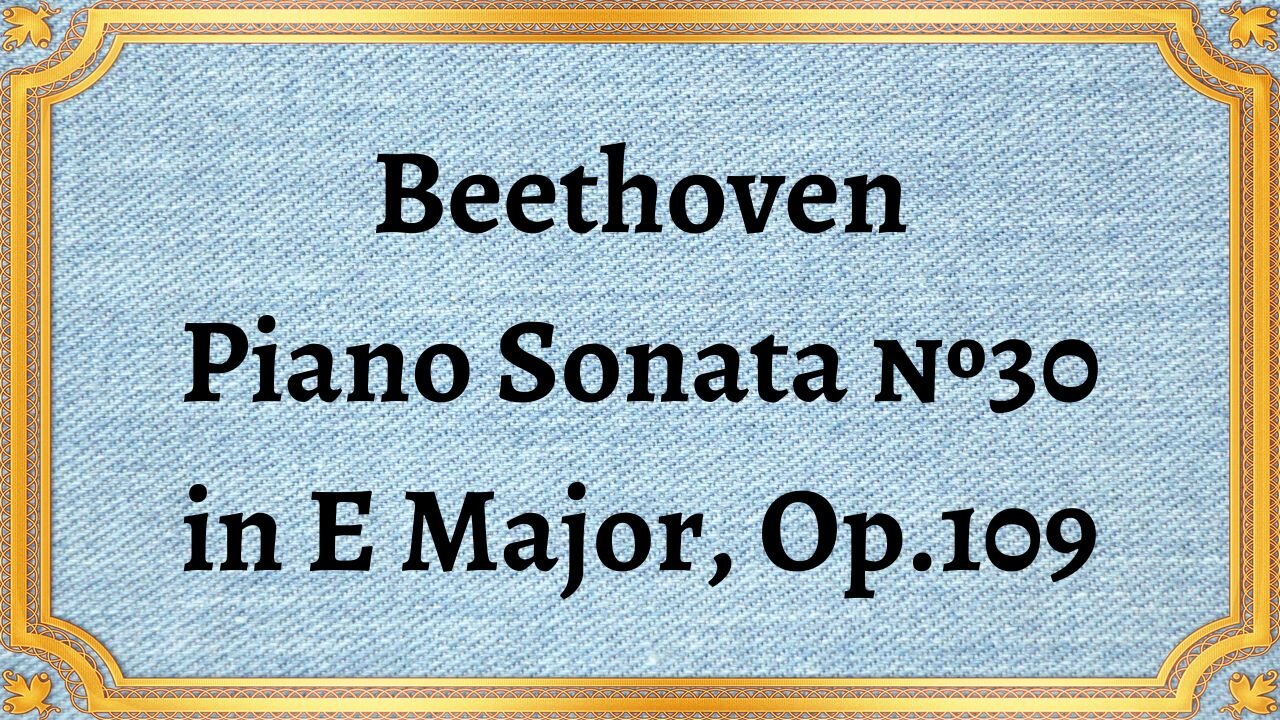Premium Only Content

Beethoven Piano Sonata №30 in E Major, Op.109
Beethoven Piano Sonata No. 30 in E Major, Op.109 is a captivating composition by Ludwig van Beethoven, a legendary figure in classical music.
Beethoven composed Piano Sonata No. 30 in E Major, Op.109 in 1820 during the late period of his illustrious career. This period was marked by Beethoven's profound exploration of new musical territories, as he broke free from traditional forms and embraced innovative techniques. Op.109 was crafted alongside other notable late works, signifying a shift in Beethoven's musical language and reflecting his personal struggles and triumphs.
The first movement, Vivace, ma non troppo, unfolds with a lively and spirited character. It features rapid passages, intricate melodic lines, and rhythmic complexity, demonstrating Beethoven's technical prowess and compositional mastery. The movement combines moments of exuberance with introspective episodes, creating a dynamic and engaging musical journey.
The second movement, Prestissimo, is a vibrant and passionate scherzo. It contrasts the lyrical qualities of the first movement with its swift tempo and energetic motifs. Beethoven incorporates abrupt changes in dynamics and playful melodic gestures, captivating the listener with its vivacity and virtuosic demands.
The final movement, Gesangvoll, mit innigster Empfindung, also known as the Arioso, is a soulful and introspective section. It begins with a serene and lyrical melody, which is then developed through variations. Beethoven's use of chromatic harmonies and expressive phrasing creates a poignant and intimate atmosphere. The movement gradually builds in intensity, culminating in a serene and transcendent coda.
Beethoven's Op.109 resonates with profound emotional depth, reflecting the composer's personal and artistic journey. The contrast between the exuberant and introspective moments within the sonata mirrors the range of human emotions, from joy and triumph to introspection and longing. Beethoven's ability to convey these emotions through his music is a testament to his genius and continues to captivate audiences across generations.
Beethoven's Piano Sonata No. 30 in E Major, Op.109 holds a significant place in the annals of classical music. Its intricate musical structure, emotional richness, and technical challenges have cemented its status as one of Beethoven's most revered compositions. Op.109 has inspired countless composers and performers, influencing the development of piano music throughout the Romantic and post-Romantic eras.
Beethoven Piano Sonata No. 30 in E Major, Op.109 stands as a testament to Beethoven's artistic brilliance and innovation. Its historical significance, intricate musical structure, and emotional resonance continue to captivate audiences worldwide. Whether you are a seasoned classical music aficionado or a curious listener, immersing yourself in the profound beauty of Op.109 is a transformative experience that brings the genius of Beethoven to life.
1. Vivace, adagio espressivo 00:00
2. Prestissimo 03:36
3. Andante molto cantabile ed espressivo 06:05
#classical_music #Beethoven #sonata_for_piano
-
 24:35
24:35
Classical music_Music Inspiration
29 days agoMax Bruch Violin Concerto No. 1 in G minor, Op. 26
891 -
 5:47
5:47
deawawa
2 years agoBeethoven Piano Sonata
7 -
 6:38
6:38
Classical Music
2 years agoBeethoven - Piano Sonata No. 15 in D major, Op. 28: I. Allegro
621 -
 41:56
41:56
Athlete & Artist Show
7 hours ago $1.20 earnedAustin Ekeler: Going From "0 Star Recruit" To Leading The NFL In TD's, New Fan App | FROM THE VAULT
27.1K1 -
 2:46:49
2:46:49
Barry Cunningham
12 hours agoNOW THEY FEAR US! | RFKJR STRIKES BACK | JD VANCE ON PRESIDENT TRUMP | AND MORE NEWS!
71.3K50 -
 LIVE
LIVE
Spartan
7 hours agoCharlotte Qualifier watch party + Ranked and Expedition 33
108 watching -
 6:09:54
6:09:54
bigbossrobinson
10 hours agoLIVE - DOUBLE IMPACT - RESIDENT EVIL 4 & METAL GEAR SOLID Δ: SNAKE EATER
33.9K1 -
 14:37
14:37
Colion Noir
12 hours agoCanadian Police Chief Urges Citizens To Comply With Home Invaders And Hide
80.6K99 -
 3:10:59
3:10:59
OVERKLOC
8 hours ago🔴LIVE - CHILL SUNDAY GAMING - WHO KNOWS WHAT WE'LL PLAY
19.6K -
 5:58:37
5:58:37
FrizzleMcDizzle
9 hours ago $0.68 earnedNightReign - Lies of P: Overture after - Come hang out
17.9K